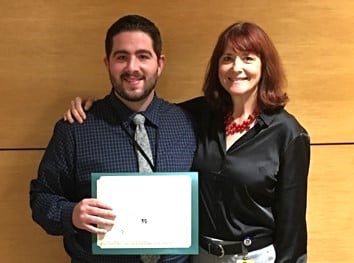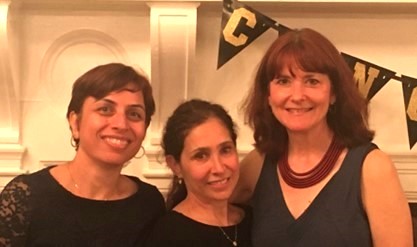Curriculum and Fellow Experience

Shaun Toomey, MD, our 2022-23 fellow, with Jennifer Reidy, MD after his induction into the
Gold Humanism Honor Society at UMass Chan Medical School.
Our clinical rotations offer robust exposure to the interdisciplinary practice of palliative medicine across settings, including a safety-net quaternary care center, academic community hospital, longitudinal outpatient clinic (with 600+ patients), long-term care facilities and home-based hospice and palliative care. We strongly value continuity of care, and fellows are encouraged to manage their clinic patients’ care when they are hospitalized and if they enroll in hospice care.
Our fellows start their year with a boot camp experience and an educational roadmap tailored to their career interests. They have half-day didactic sessions every month with core faculty and meet regularly with the program director for mentorship, scholarship activities and professional development.
Curriculum Overview
For your reference, here's a grid of all of our rotation blocks.
Inpatient consult services (six months): Fellows spend four months at UMass Memorial Medical Center - University Campus, the major safety net hospital serving Central Massachusetts with a Level 1 Trauma Center, Comprehensive Stroke Center, Heart and Vascular Center, and Children’s Medical Center. Fellows care for patients receiving complex cancer therapies, solid organ and bone marrow transplantation, left-ventricular assist devices and intensive care in medical, cardiac, surgical, and neuro-critical care units. Fellows spend two months at UMass Memorial Medical Center - Memorial Campus, a community hospital with a Level III Neonatal Intensive Care Unit, gynecologic oncology and colorectal surgery services, and medical and surgical intensive care units. Fellows can continue to care for patients they meet in the hospital after discharge on their continuity clinic panel.
Ambulatory palliative care (half day per week): Fellows care for their own continuity panel of patients over the year with support from a faculty preceptor and a nurse navigator. Our clinic is co-located with the UMass Cancer Center Center of Excellence but we care for all patients with a wide array of serious illnesses. We have a pulmonary-palliative care clinic for people with advanced lung disease and a close collaboration with the Multidisciplinary ALS Clinic where we conduct joint visits with neurology providers.
Hospice (two months): Fellows see patients at home and in nursing facilities with our community partners, Notre Dame Hospice and VNA Care Network Hospice. They participate in the role of hospice medical director under expert guidance and learn how to triage and manage calls from hospice nurses in the field.
Pediatric palliative care (one month): This is a combined inpatient and community-based rotation, enabling fellows to participate in the care of children and families across care settings. Fellows observe inpatient care in our 30-bed Pediatric Intensive Care Unit and the Children’s Medical Center at the University Campus. They ride along for home visits with the Notre Dame Health Care’s pediatric palliative care team, which the largest in Massachusetts and includes child life specialists, pediatric nutritionists and music therapists.
Long-term care (one month): At area nursing homes, fellows help address the palliative care needs of older adults and their families under the guidance of UMass geriatricians. They become integral members of the interdisciplinary team, including nurses, social workers, physical and occupational therapists, nutritionists and health aides. Fellows participate in home visits to understand the intersection of palliative medicine and geriatrics in the care of older adults.
Electives (one month): Elective time is an important space where fellows can explore areas of interest that shape their education and career goals. Our electives include medical ethics, interventional pain anesthesia, pastoral care, health psychology, quality science with Lean certification, and subspecialty clinical rotations (ALS clinic, multidisciplinary cancer clinics, ECMO/VAD, wound care, among others). Under the supervision of the program director, fellows can also build their own elective opportunity. There is time for ACGME-required scholarly activity built into elective time as well.
Scholarly activity (one month): Fellows are expected to complete a quality improvement or research project with a mentor over the year. They can use this month to write manuscripts for publication, prepare grand rounds presentations, or finalize curricular materials, among other activities.
|
Our Vital Talk-trained faculty have designed a longitudinal, developmentally based curriculum -introducing palliative care -discussing opioid safety and substance use disorder without stigma -navigating code status conversations -exploring hopes for a miracle and spiritual/existential distress -discussing end of life with cultural intelligence and humility -responding to microaggressions -disclosing error and making an apology During each two-hour session, fellows receive real-time feedback and opportunities to try |
